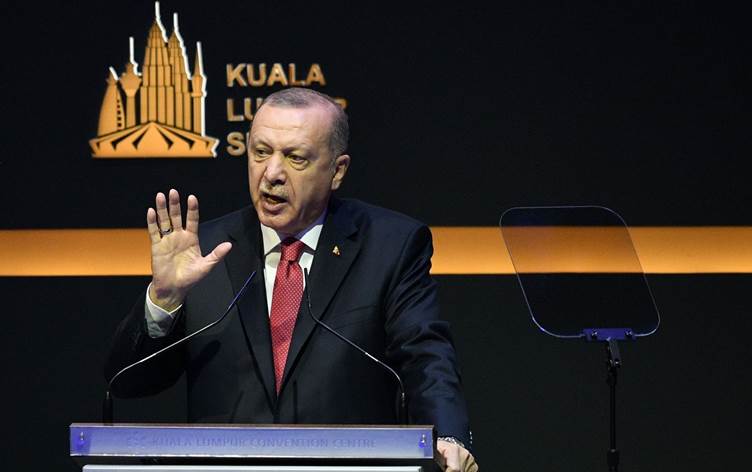ERBIL, Kurdistan Region — Turkish President Recep Tayyip Erdogan said Friday that his country may impose retaliatory sanctions on the US if Washington goes ahead with the sanctions it has planned for Turkey due to its military and economic deals with Russia.
The US Senate passed its controversial $738 billion defense spending bill on Tuesday, which prohibits the delivery of the F-35 jets to Turkey over its purchase of the Russian S-400 missile defense systems.
For the same reason, US Congress has moved to impose economic sanctions on its NATO ally, as well as Russia’s TurkSteam pipeline designed to carry Russian gas to Turkey.
Erdogan, currently attending the Kuala Lumpur Summit of Muslim world leaders, has hit back at the bill’s measures.
“This is a complete violation of our rights. Of course, we will have sanctions against all these,” Turkish state-owned Anadolu Agency reported Erdogan as saying in Malaysia on Friday.
Turkey will “put our sanctions into practice” once the US goes ahead with its sanctions against Ankara, he added.
Initial Turkish reaction to the bill’s passage came from Hami Aksoy, spokesperson for the ministry of foreign affairs, who claimed the bill contains “negative language targeting Turkey.”
“This is the latest outcome of the agenda pursued by Members of Congress who are bent on damaging our bilateral relations by any means,” Aksoy said.
“Turkey condemns the exploitation of even an ordinary budgeting process for the sake of the short term political ambitions of US politicians,” he added.
Russia and Turkey signed a $2.5 billion deal for the delivery of the S-400 system to Ankara in September 2017. Delivery began on July 12; Turkey was receiving components of the Russian system until September. Ankara began testing the S-400 system in late November.
Purchase of the S-400 system, which the US says is incompatible with its NATO defenses, has strained Ankara-Washington relations. The US suspended Turkey from the F-35 fighter jet program in response to the deal’s finalization.
The defense spending bill has been sent to US President Donald Trump – who enjoys good relations with Erdogan – for approval. It is unclear whether his friendship with Erdogan will be prioritized over the decision of US senators.
One day before the bill was passed, Erdogan threatened to close down Incirlik Air Base – which houses US troops, Kurecik Radar Station, and is used by NATO countries – should the US impose sanctions.
“If necessary, we will hold discussions with all our delegations, and if necessary, we may close Incirlik [air base in southern Adana province] and Kurecik [radar station in eastern Malatya province],” Erdogan said in a televised interview on Monday.
The US bill’s sanctions would be implemented within the framework of the Countering America’s Adversaries Through Sanctions Act (CAATSA). Turkey is the fourth country to be targeted via CAATSA, after Russia, Iran and North Korea.
If imposed, the sanctions would mean that Turkey would be subject to a number of punitive tariffs, barred from accessing international funds, and banned from buying ammunition – to name a few, according to Deutsche Welle.
Reuters reported on Wednesday that the bill has already harmed the Turkish lira, which fell to its weakest level in two months by Tuesday.
The defense bill not only imposes a series of restrictions on Turkey, but sees a relieving of restrictions on its regional adversaries – including the lifting of a US arms embargo on the Republic of Cyprus, which has been in conflict with Turkey since 1974.
Cyprus has since been divided into the Republic of Cyprus, administered by Greek Cypriots, and the Turkish Republic of Northern Cyprus. While the Republic of Cyprus is internationally recognized, only Turkey recognizes Northern Cyprus.
Greece and Turkey have been at loggerheads for years over the Mediterranean island’s disputed waters. Ankara recently sent drones to protect Turkish research ships searching for energy resources off the coast of the gas-rich island.

